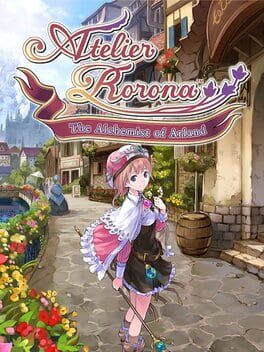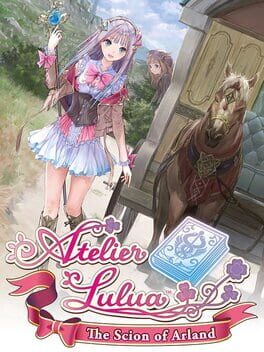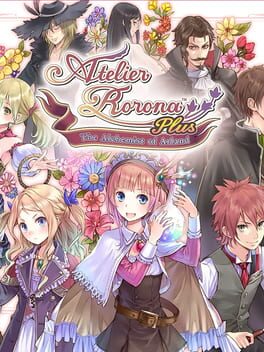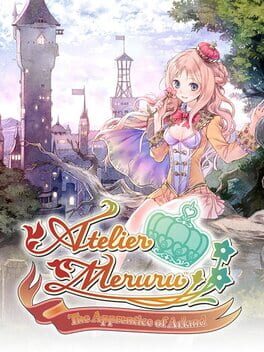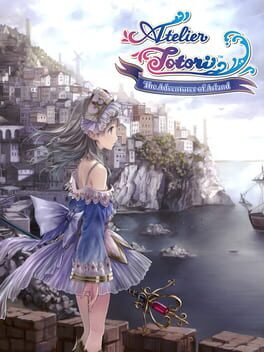

Atelier Rorona: The Alchemist of Arland is a Japanese role-playing video game developed by Gust. Atelier Rorona is the eleventh installment in the Atelier series, and it is the first title in the series to be developed for PlayStation 3, and it is also the first to utilize 3D models as opposed to the 2D sprites in earlier titles. Atelier Rorona's storyline is presented as a series of twelve tasks. Each of these tasks amounts to three months of the game's storyline and requires the player to complete it by the end of the period. The game has four main modes of gameplay: a field map, a battle screen, an alchemy system, and a visual novel system.
Also in series
Reviews View More
For almost a year now, I've been co-streaming with a friend every weekend and commentating while I watch her play the games. We started with Idea Factory games, but after dropping out of Fairy Fencer F when we realized it was hot garbage even for an IF game, we hopped into another game she was in the middle of playing: Atelier Rorona + (the remake of this game). I've since gone through Atelier Totori (Rorona's sequel) with her and now we're into Atelier Meruru (Totori's sequel) as well, and it's gotten me really interested in trying out the series. I was able to find a copy of the original version of Rorona for very cheap, so I figured it was a good a time as any to try it out, and I ended up absolutely loving it~. It took me around 34 hours to beat the Japanese version of the game with Cordelia's ending.
Atelier Rorona is a bit of an odd RPG as far as the story is concerned. There is no world-saving fight, or even a fight at all. The game honestly barely has an antagonist at all. Rorona is working as the apprentice at Arland's atelier when one day a knock comes at the door. It's a knight from the castle with an important message: the atelier is going to be shut down! Rorona panics and tries to help, but before she knows it, Astrid, the dismissive and selfish master of the atelier, gives the atelier to her to manage and save instead. What follows is three years of fulfilling tasks for the people of Arland as well as new requests from the castle every 3 months to prove that the atelier is worth keeping around.
As I said before, it's a bit of an unconventional setup for a major console JRPG. The only real thing standing between you and a good ending is completing those quests for the castle. As long as you hit a minimum requirement, you won't get a game over or anything. The other things you have to keep engaged are quests for the town to up your popularity et large, and quests for characters around the town. The town popularity as well as doing extra good on the castle quests determines how good an ending you'll get, and doing requests and quest lines for your friends around town will influence you getting certain extra events and character-specific endings.
I really adored the writing in Rorona. It's a lot of smaller slice of life stuff between Rorona, her friends, and other people around town, but I found it very charming. The character quest lines especially were something I really enjoyed, and I did as many as I could. It's a very grounded game that doesn't really stretch the suspension of disbelief very far. The stakes are pretty low, in the grand scheme of things, but this is a game with a very small scope. For Rorona, having the atelier shut down and being forced to leave the city and everyone she cares about would be the end of the world for her, so the stakes couldn't be much higher on a personal level. Atelier Rorona really nails interpersonal relationship writing and that is definitely one of the main highlights of the game. It's also a game that tells stories about relationships that lets people be friends without any of the constant romantic tension, fan service, or queerbaiting that SO much other anime and anime-styled games (not to mention later Atelier games) use, which is another thing I really appreciated.
So just what IS an "atelier" anyway? Well in these games, they're functionally a sort of alchemist's shop. Rorona herself is an alchemist, and you go around the kingdom of Arland fighting monsters and gathering ingredients (and fighting monsters TO get ingredients) to fulfill the quests of the castle and the citizens. The game has a few castle requests that are kinds of combat checks, but the game otherwise has more of a focus on crafting and time management than combat. It doesn't even have a final boss and hardest fights in the game are all optional unless you're going for specific extra endings.
The gameplay of the Atelier games almost always revolves around a larger time limit you must complete your quest within/around, and that time limit then informs a lot of the rest of the gameplay. However, Rorona is definitely one of the more forgiving Atelier games in that regard, and that extends to more than just how easy it is to stay focused on the task at hand via the 3-month requests from the castle (which function sorta as 12 chapters to the game). Where in other Atelier games EVERYTHING takes up time (fighting, gathering, traveling, crafting), in Rorona only traveling and crafting take time. Once at a location, you're free to fight and gather to your heart's content without fear of wasting time, as the time you'll spend there has already been decided. The fairly relaxed requirements of the castle requests combined with this forgiving time management system make Rorona an ideal game to start out with for anyone interested in the series.
The combat and crafting of Rorona are both fairly involved but also ultimately quite simple. For starters, unlike many of its sister Atelier games, Rorona has no MP mechanic for casting spells and no LP mechanic for mitigating how much you can travel in one outing before needing to rest. There is no mechanic at all mitigating how much you can travel, really, and spells are cast by deducting MP rather than HP. This makes for a fairly interesting dynamic, especially with characters who can heal via spells, of just how you're going to balance the actions of your 3-person party to both do enough damage to win but also not die. As a rule, you're quite survivable, but the boss-like enemies in the game know this, and so they will really push your ability to win a battle of attrition unless you're really REALLY prepared (especially the two hardest fights). In this game as well as most other Atelier games, only the alchemist themself can use items, and so crafting items to attack and heal is all well and good, but your party members can't use them. The alchemist also tends to be weaker defensively, so as your party members gain points in an assist gauge so they can take a hit for Rorona or join in with one of her melee attacks to give her a helping hand.
The game also has an interesting elemental magic system that, while not bad, isn't super well thought out either. Every party member has two spells, and more than can be unlocked to cast depending on the elemental status of the battlefield. Cast more spells of that element which your party member uses most, and more powerful spells will be available to you for that fight. If you get to level 5 elemental status, you can then cast a super move, but that super move will reset your elemental gauge back to 0, so you need to decide if it's worth one big attack at the price of being able to do better magics for a little while. The thing is, that enemies can also influence that elemental status, so if you use and your enemy have opposite elemental spell affinities, you're gonna have a very hard time building up any elemental levels and that character's spells are gonna be pretty weak during that fight. In later games they simplify this system to be locked to the respective character instead of something everyone influences, which is a big improvement. In Rorona, that system is cool but quite flawed.
However, the crafting adds a lot of potential spice to your battles. All the items you have have both qualities and traits which will affect the effect of the end product. In terms of healing items and attacking items (bombs), it'll influence the strength of the item to how many charges the item has or even if the item will be an AOE or not. For equipment, it will affect not just the stats of the item, but also passives it will grant you as well as extra spells that your elemental level will unlock in battle. Quite often I found it wasn't actually advantageous to use a new weapon I could craft because despite being a higher gear tier, it gave me spells I liked less or the extra traits on it weren't good enough. You often need to choose between lower tier gear with better traits or higher tier gear with less numerous/less ideal traits, and it gives a lot of nuance to how you'll approach making your gear.
All that said, Atelier Rorona definitely shows its age in its mechanics but especially its UI. The information given to the player at one time is very annoyingly clunky quite often, and going through menus to check if you can craft something at all is only one thing you'll butt against. The most prominent annoyance I had was in regards to making weapons and armor, as I'm not sure there's actually any way to check the stats of what you're currently wearing, let alone is there any way to know the stats of what you're about to craft to then easily compare to what you currently have. It's honestly quite tough to even compare one armor to another, given how the passives and stat boosts outside of the stats related to that specific weapon work. The remake of Rorona spruces up a lot of things aesthetically, but the one mechanical godsend it offers above all others is importing the crafting system from Atelier Meruru, and that one addition would be the main reason (even more than the remake's new playable character) I'd say it's worth shelling out extra for the remake rather than this version.
Presentation-wise, Rorona also shows its age a bit as the first 3D game in the Atelier series (which shockingly enough didn't have a single 3D game on the PS2 despite having like six games on the system). The art style for the character models has them all as these baby-ish chibis, which isn't a problem in and of itself, but it can look quite uncanny given that the dialogue (which is all very well voice acted) uses 2D portraits with many reaction versions as well. This makes a weird demarcation between the characters in your mind's eye and how they look in front of you as you do battle, and making the 3D models look like the 2D portraits is another welcome addition that the Rorona remake adds. What holds up best of all, however, is just how good the music is. Atelier Rorona has an excellent and bubbly musical score with tons of music that just won't get out of my head. It fits the scenes perfectly, and the character and location themes especially fit their purposes splendidly.
Verdict: Recommended. If this were the remake, I'd probably put this as a "highly recommended", but even at this level I still adore this game. Had I finished this before the end of last year, it would've been my #3 favorite game I played that year. If you're someone who prefers your RPGs to offer technical puzzles to solve in regards to its combat and interlocking systems, then you will likely be very bored by Atelier Rorona. However, if you're someone like me who prefers good storytelling and character writing over complex systems, then there is a lot of joy to be found with Atelier Rorona, and if you've ever considered giving the series a try, then Rorona (and moreso its remake) is an excellent place to start ^w^
Atelier Rorona is a bit of an odd RPG as far as the story is concerned. There is no world-saving fight, or even a fight at all. The game honestly barely has an antagonist at all. Rorona is working as the apprentice at Arland's atelier when one day a knock comes at the door. It's a knight from the castle with an important message: the atelier is going to be shut down! Rorona panics and tries to help, but before she knows it, Astrid, the dismissive and selfish master of the atelier, gives the atelier to her to manage and save instead. What follows is three years of fulfilling tasks for the people of Arland as well as new requests from the castle every 3 months to prove that the atelier is worth keeping around.
As I said before, it's a bit of an unconventional setup for a major console JRPG. The only real thing standing between you and a good ending is completing those quests for the castle. As long as you hit a minimum requirement, you won't get a game over or anything. The other things you have to keep engaged are quests for the town to up your popularity et large, and quests for characters around the town. The town popularity as well as doing extra good on the castle quests determines how good an ending you'll get, and doing requests and quest lines for your friends around town will influence you getting certain extra events and character-specific endings.
I really adored the writing in Rorona. It's a lot of smaller slice of life stuff between Rorona, her friends, and other people around town, but I found it very charming. The character quest lines especially were something I really enjoyed, and I did as many as I could. It's a very grounded game that doesn't really stretch the suspension of disbelief very far. The stakes are pretty low, in the grand scheme of things, but this is a game with a very small scope. For Rorona, having the atelier shut down and being forced to leave the city and everyone she cares about would be the end of the world for her, so the stakes couldn't be much higher on a personal level. Atelier Rorona really nails interpersonal relationship writing and that is definitely one of the main highlights of the game. It's also a game that tells stories about relationships that lets people be friends without any of the constant romantic tension, fan service, or queerbaiting that SO much other anime and anime-styled games (not to mention later Atelier games) use, which is another thing I really appreciated.
So just what IS an "atelier" anyway? Well in these games, they're functionally a sort of alchemist's shop. Rorona herself is an alchemist, and you go around the kingdom of Arland fighting monsters and gathering ingredients (and fighting monsters TO get ingredients) to fulfill the quests of the castle and the citizens. The game has a few castle requests that are kinds of combat checks, but the game otherwise has more of a focus on crafting and time management than combat. It doesn't even have a final boss and hardest fights in the game are all optional unless you're going for specific extra endings.
The gameplay of the Atelier games almost always revolves around a larger time limit you must complete your quest within/around, and that time limit then informs a lot of the rest of the gameplay. However, Rorona is definitely one of the more forgiving Atelier games in that regard, and that extends to more than just how easy it is to stay focused on the task at hand via the 3-month requests from the castle (which function sorta as 12 chapters to the game). Where in other Atelier games EVERYTHING takes up time (fighting, gathering, traveling, crafting), in Rorona only traveling and crafting take time. Once at a location, you're free to fight and gather to your heart's content without fear of wasting time, as the time you'll spend there has already been decided. The fairly relaxed requirements of the castle requests combined with this forgiving time management system make Rorona an ideal game to start out with for anyone interested in the series.
The combat and crafting of Rorona are both fairly involved but also ultimately quite simple. For starters, unlike many of its sister Atelier games, Rorona has no MP mechanic for casting spells and no LP mechanic for mitigating how much you can travel in one outing before needing to rest. There is no mechanic at all mitigating how much you can travel, really, and spells are cast by deducting MP rather than HP. This makes for a fairly interesting dynamic, especially with characters who can heal via spells, of just how you're going to balance the actions of your 3-person party to both do enough damage to win but also not die. As a rule, you're quite survivable, but the boss-like enemies in the game know this, and so they will really push your ability to win a battle of attrition unless you're really REALLY prepared (especially the two hardest fights). In this game as well as most other Atelier games, only the alchemist themself can use items, and so crafting items to attack and heal is all well and good, but your party members can't use them. The alchemist also tends to be weaker defensively, so as your party members gain points in an assist gauge so they can take a hit for Rorona or join in with one of her melee attacks to give her a helping hand.
The game also has an interesting elemental magic system that, while not bad, isn't super well thought out either. Every party member has two spells, and more than can be unlocked to cast depending on the elemental status of the battlefield. Cast more spells of that element which your party member uses most, and more powerful spells will be available to you for that fight. If you get to level 5 elemental status, you can then cast a super move, but that super move will reset your elemental gauge back to 0, so you need to decide if it's worth one big attack at the price of being able to do better magics for a little while. The thing is, that enemies can also influence that elemental status, so if you use and your enemy have opposite elemental spell affinities, you're gonna have a very hard time building up any elemental levels and that character's spells are gonna be pretty weak during that fight. In later games they simplify this system to be locked to the respective character instead of something everyone influences, which is a big improvement. In Rorona, that system is cool but quite flawed.
However, the crafting adds a lot of potential spice to your battles. All the items you have have both qualities and traits which will affect the effect of the end product. In terms of healing items and attacking items (bombs), it'll influence the strength of the item to how many charges the item has or even if the item will be an AOE or not. For equipment, it will affect not just the stats of the item, but also passives it will grant you as well as extra spells that your elemental level will unlock in battle. Quite often I found it wasn't actually advantageous to use a new weapon I could craft because despite being a higher gear tier, it gave me spells I liked less or the extra traits on it weren't good enough. You often need to choose between lower tier gear with better traits or higher tier gear with less numerous/less ideal traits, and it gives a lot of nuance to how you'll approach making your gear.
All that said, Atelier Rorona definitely shows its age in its mechanics but especially its UI. The information given to the player at one time is very annoyingly clunky quite often, and going through menus to check if you can craft something at all is only one thing you'll butt against. The most prominent annoyance I had was in regards to making weapons and armor, as I'm not sure there's actually any way to check the stats of what you're currently wearing, let alone is there any way to know the stats of what you're about to craft to then easily compare to what you currently have. It's honestly quite tough to even compare one armor to another, given how the passives and stat boosts outside of the stats related to that specific weapon work. The remake of Rorona spruces up a lot of things aesthetically, but the one mechanical godsend it offers above all others is importing the crafting system from Atelier Meruru, and that one addition would be the main reason (even more than the remake's new playable character) I'd say it's worth shelling out extra for the remake rather than this version.
Presentation-wise, Rorona also shows its age a bit as the first 3D game in the Atelier series (which shockingly enough didn't have a single 3D game on the PS2 despite having like six games on the system). The art style for the character models has them all as these baby-ish chibis, which isn't a problem in and of itself, but it can look quite uncanny given that the dialogue (which is all very well voice acted) uses 2D portraits with many reaction versions as well. This makes a weird demarcation between the characters in your mind's eye and how they look in front of you as you do battle, and making the 3D models look like the 2D portraits is another welcome addition that the Rorona remake adds. What holds up best of all, however, is just how good the music is. Atelier Rorona has an excellent and bubbly musical score with tons of music that just won't get out of my head. It fits the scenes perfectly, and the character and location themes especially fit their purposes splendidly.
Verdict: Recommended. If this were the remake, I'd probably put this as a "highly recommended", but even at this level I still adore this game. Had I finished this before the end of last year, it would've been my #3 favorite game I played that year. If you're someone who prefers your RPGs to offer technical puzzles to solve in regards to its combat and interlocking systems, then you will likely be very bored by Atelier Rorona. However, if you're someone like me who prefers good storytelling and character writing over complex systems, then there is a lot of joy to be found with Atelier Rorona, and if you've ever considered giving the series a try, then Rorona (and moreso its remake) is an excellent place to start ^w^
